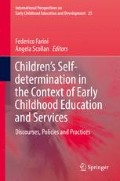Abstract
The purpose of this chapter is to describe the initial encounter of a democratic meetings between children and their preschool teacher and to examine children’s involvement in democratic practices during class activities.
Democratic meetings are defined as those providing participants with the opportunity to care for, expand and share each other’s experiences. We examined the practices of Japanese preschool education, with an emphasis on learning, careful listening and empathy amongst children. This research is based on the idea that every child has agency and can be understood as an equal participant in everyday life. Research found that children’s potential can be reflected in their expression of feelings and their attainment of goals, as well as through their interactions via indirect engagement with teachers.
Access this chapter
Tax calculation will be finalised at checkout
Purchases are for personal use only
References
Aries, P. (1962). Century of childhood: A social history of human life. New York: Knopf.
CEDEP. (2016). Result report of Japanese large-scale survey on ECEC settings. In Open symposium ‘exploring the truth of early Chilhdood education and Care in Japan: Listening to the voice of nine million teachers and 1,700 local government officials. http://www.cedep.p.utokyo.ac.jp/project_report/symposiumseminar/sympo_20160917/.
Clark, A. (2005). Ways of seeing: Using the Mosaic approach to listen to young children’s perspectives. In A. Clark, A. T. Kjørholt, & P. Moss (Eds.), Beyond listening. Children’s perspectives on early childhood services (pp. 29–49). Bristol: Policy Press.
Clark, A., & Moss, P. (2001). Listening to young children using the Mosaic approach. London: National Children’s Breau for the Joseph Rowntree Foundation.
Dahlberg, G., & Moss, P. (2006). Introduction: Our Reggio Emilia. In C. Rinaldi (Ed.), Dialogue with Reggio Emilia: Listening, researching and learning (pp. 1–22). London: Routledge.
Dewey, J. (1916). Education and democracy. New York: Macmillan.
Dewey, J. (1938). Experience and education. New York: Macmillan.
Dewey, J. (1997). How we think. Dover publications. New York: Dover Publication.
Einarsdottir, J. (2014). Children’s perspectives on the role of preschool teachers. European Early Childhood Education Research Journal, 22(5), 679–697.
Engdahl, I. (2010). World declaration about the right and the joy to learn through play. Available at: http://www.worldomep.org/files/1316663_omep-world-declaration-2010-eng.pdf. Accessed on 5.2.2017.
Harcourt, D., & Einarsdottir, J. (2011). Introducing children’s perspectives and participation in research. European Early Childhood Education Research Journal, 19(3), 301–307.
Lave, J., & Wenger, E. (1991). Situated learning: Legitimate peripheral participation. Cambridge: Cambridge University Press.
Malaguzzi, L. (1998). The hundred languages of children: The Reggio Emilia approach–advanced reflections. In C. Edwards, L. Gandini, & G. Forman (Eds.), History, ideas, and basic philosophy: An interview with Lella Gandini by Loris Malaguzzi (pp. 49–98). Westport: Ablex Publishing.
Mashford-Scott, A., Church, A., & Tayler, C. (2012). Seeking children’s perspectives on their wellbeing in early childhood settings. International Journal of Early Childhood, 44(3), 231–247.
Mayall, B. (2002). Towards a sociology for childhood: Thinking from children’s lives. Buckingham: Open University Press.
Ministry of Education, Culture, Sports, Science and Technology of Japan. (2008). Course of study for kindergarten. Tokyo: Froevel-kan.
Miyamoto, Y., Akita, K., Tsujitani, M. Miyata, M. (2016). Preschool children’s recognition of playgrounds: Adopting projective method by children. The Japanese Journal for the Education of Young Children, 24, 9–21.
Moss, P. (2007). Bringing politics into the nursery: Early childhood education as a democratic practice. European Early Childhood Education Research Journal, 15(1), 5–20.
Noddings, N. (1995). Philosophy of education. Boulder: Westview Press.
Noddings, N. (2013). Caring: A relational approach to ethics and moral education (2nd ed.). Berkeley: University of California Press.
OHCHR (Office of the High Commissioner for Human Rights). (1989). The United Nations convention on the rights of the child. Available at: http://www.ohchr.org/en/professionalinterest/pages/crc.aspx. Accessed on 5.2.2017.
Pascal, C., & Bertram, T. (2009). Listening to young citizens: The struggle to make real a participatory paradigm in research with young children. European Early Childhood Education Research Journal, 17(2), 249–262.
Rinaldi, C. (2006). In dialogue with Reggio Emilia: Listening, researching and learning. London: Routledge.
Siraj-Blatchford, I., Silva, K., Muttock, S., Gilden, R., & Bell, D. (2002). Researching effective pedagogy in the early years. Oxford: University of Oxford, Department of Educational Studies.
Tholin, K. R., & Jansen, T. T. (2012). Something to talk about: Does the language use of pre-school teachers invite children to participate in democratic conversation? European Early Childhood Education Research Journal, 20(1), 35–46.
Trevarthen, C. (2012). Finding a place with meaning in a busy human world: How does the story begin, and who helps? European Early Childhood Education Research Journal, 20(3), 303–312.
van Manen, M. (1990). Researching lived experience: Human science for an action sensitive pedagogy. Albany: State University of New York.
Author information
Authors and Affiliations
Corresponding author
Editor information
Editors and Affiliations
Rights and permissions
Copyright information
© 2019 Springer Nature Switzerland AG
About this chapter
Cite this chapter
Miyamoto, Y. (2019). Practices/2, Japan: The Exploration of Four-Year-Olds Potential: Focusing the Democratic Meeting During the Sports Festival Day. In: Farini, F., Scollan, A. (eds) Children’s Self-determination in the Context of Early Childhood Education and Services. International Perspectives on Early Childhood Education and Development, vol 25. Springer, Cham. https://doi.org/10.1007/978-3-030-14556-9_3
Download citation
DOI: https://doi.org/10.1007/978-3-030-14556-9_3
Published:
Publisher Name: Springer, Cham
Print ISBN: 978-3-030-14555-2
Online ISBN: 978-3-030-14556-9
eBook Packages: EducationEducation (R0)

